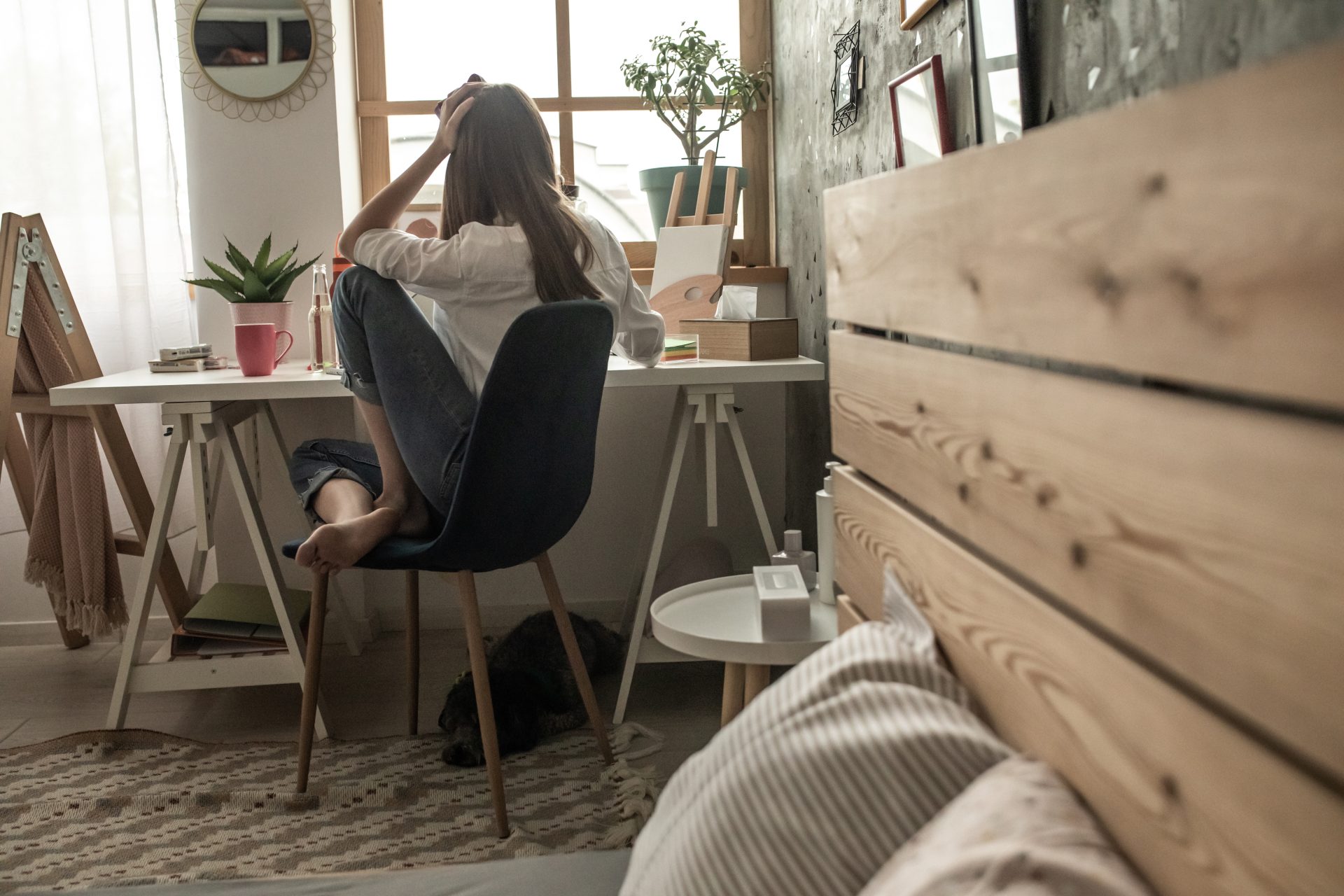Getting tasks ticked off your to-do list shouldn’t be hard, but in our world of procrastination, it can feel nearly impossible. But researcher Professor Fuschia Sirois thinks she might have a solution.
We are a generation of procrastinators. Stats vary on how much and how often we do it, with some studies suggesting up to 88% of us procrastinate every day.
Professor Fuschia Sirois from Durham University knows only too well how much impact procrastination has on us. As a health psychologist, she’s spent the past 20 years researching procrastination, culminating in her book Procrastination: What It Is, Why It’s a Problem, and What You Can Do About It.
It is the ultimate guide to stopping your distractions and actually getting on with stuff – a skill that sounds simple yet so many of us lack, including myself. Feeling like I can’t get through tasks is a habit I want to nip in the bud before I flip my life upside down by starting a new job and moving to a different town.
I want to be the best, procrastination-free version of myself when I start this new phase of my career, so I asked for Professor Sirois’ help on how to get things done, and she shared some of the steps from her research and her book.
7 steps to stop procrastinating
1. Know the impact of procrastination
The first step is to understand why procrastination is bad – and it’s not just for the reasons you might think: “It’s not just about a lack of productivity – procrastination also comes with collateral damage in the form of your reputation and, more importantly, nearly all of my research in the past two decades focuses on the health and wellbeing effect of procrastination,” Professor Sirois says.
“I’ve found it causes stress and stress is bad for your health. So, procrastination is bad for your health.”
My ears are pricked. This is a red flag for someone who takes stress management seriously – perhaps it really is time for me to stop putting off procrastination.
2. Define procrastination
So we know it’s bad. But Professor Sirois tells me that I can’t stop procrastinating if I don’t know what it is. The tips she gives me need context, she says, and to define procrastination is to distinguish it from delay.
“All procrastination is delay, but not all delay is procrastination. That’s a subtle but really important difference because there’s a difference between wise delay, in which you put off something because you don’t have enough information or resources, and intentional delay, which is saying, ‘I just don’t feel like doing this right now because it makes me feel uncomfortable.’ The latter is procrastination,” says Professor Sirois.

3. Work out what tasks you procrastinate on
Despite what I thought, we don’t procrastinate because we have too many distractions. Yes, you might find yourself on your phone scrolling TikTok, but apparently, it isn’t social media itself that makes us procrastinate – that’s just where we spend our time while we avoid things we don’t want to do.
“The research consistently shows that people procrastinate on tasks that they find aversive and unpleasant. Human beings are very much drawn to approach things that are rewarding and avoid things that we find aversive. Procrastination is actually an avoidance response to something that we find unpleasant, boring, outright anxiety-provoking, stressful or might threaten our self-esteem,” says Professor Sirois.
You may also like
Procrastination: there are 6 different ‘types’ of procrastinators – which one are you?
If you’ve noticed that you don’t delay calling your friend in the same way you delay unloading the washing machine, you’re probably onto something. But, I ask, I’ve been known to put off things that I do want to do. I sometimes put off going to the gym even though I love to exercise, I put off writing things that I want out in the world and I put off messaging friends about making plans even though I want to see them.
“We procrastinate because of the emotional reaction that we have to a task,” says Professor Sirois. Often, that is a perfectionist tendency – a worry that we won’t do it well so it’s better to not bother. I think about it more and realise that I mainly struggle to focus on work when things aren’t quite coming together as I think they should. My avoidance is often a technique born from frustration with myself.
When it comes to things like organising my diary, it might be that the end goal is fun with my friends, but the process is uncomfortable. No one is ever free at the same time, you have to find somewhere to go that everyone is happy with and people ask to bring boyfriends you don’t like – a mammoth task I subconsciously don’t want to bother with.
4. Don’t predict your procrastination
The solution to that is to avoid ‘effective forecasting’, Professor Sirois says. “This is where we tell ourselves how bad we think a task is going to be before we do it. We build up a picture of what it will feel like, but the problem is that numerous studies over the years show we are actually really, really rotten judges of future feelings.”
You may also like
How “future fatigue” is impacting your mental health, and how to overcome it
I make it a rule to stop telling myself that things I don’t enjoy are going to be hard. That counts for packing up my flat before I move, a task which feels so horrendous I’ve been paralysed by indecision and boredom. I’ve overthought it to the point that it feels like a wave is breaking on my brain when I consider whether my jumpers should go in a bag or a suitcase.
I can’t trick myself into saying it’s going to be fun, so I opt for just saying nothing at all. I don’t think about it, and when I open my drawers and start to pull things out, I seem to have clothes in bags and not hate it. Perhaps the key for me isn’t to stop projecting negative thoughts but to stop projecting at all.
5. Set up a procrastination-free environment
When Professor Sirois first says this, I assume she means to take your phone out of your workspace and clean your desk or note pads, mugs and tweezers that you left there last time you started procrastinating by plucking your brows. But remember what she says about distraction not causing procrastination?

“A procrastination-free environment means making sure that you’ve got information about any task that you’re working on so that you’re ready to start,” she says. “Uncertainty creates anxiety, which can lead to procrastination,” she explains.
I start this step by ensuring my email inbox is open on my computer so I can flit between briefs and quotes that have landed in my inbox as I work. But I realise that this feeds my procrastination: I end up closing the messages that have the information I need in them and begin reading new messages I’m being sent.
So, I make it simpler: I copy and paste every quote, every stat and every sliver of information into one doc and close everything else. Before long, I realise I’ve written a piece without googling some research I needed halfway through and end up lost in an unrelated corner of the internet.
6. Find meaning in tasks you usually procrastinate over
Given that we are likely to put off tasks that we find boring or annoying, Professor Sirois says the solution is to find meaning in them. That’s doable with certain tasks that have a clear end goal – I can just about allow myself to pack when I know there’s a reason for the pain – but some tasks are simply dull.
You may also like
How to beat loneliness: the “flow state” of challenging, meaningful exercise can make you feel less alone
“The key thing with those tasks is to hook them on to something larger and more meaningful. That’s called reframing or reappraisal and it’s a good way to make meaning out of a task that is simply boring. See it perhaps in the larger context of something that is important to you,” she says.
I look at the Asos parcel I packaged up but have yet to take to the post office and ask myself what I want to do with that £25 I will have refunded. It’s enough for a few cocktails out with my boyfriend before I move out of London – that means something to me, so I stomp off to the shop. I also tell myself that I can’t send an important work email before I’ve gone through my unread ones, and it is surprising how fast I can hit delete or reply when something exciting is depending on it.
7. Stop feeling guilty for procrastinating
We feel a lot of guilt and shame around procrastination. That’s why I’m writing this article – because I feel stupid for not being able to simply get on with things. But this is counterintuitive, says Professor Sirois.
“It has a lot to do with the norms that we have in society about being a productive person. If you’re productive, you’re good and if you’re not productive (often because you’re procrastinating), you’re bad. That stops us from reaching out for help or asking for information that might help us be comfortable or less anxious about completing tasks,” she says.
When we don’t ask for help, we procrastinate more, and then we feel more shame. And what do we do when we feel bad about a task? We procrastinate more. “You end up stuck beneath a pile of negative feelings,” says Professor Sirois.
Asking for help is a harder task than most of us care to admit. But I call my mum and admit to her that I haven’t yet booked the removal van she is driving to my flat to help with my move, despite promising her I would have done it days ago. “The problem is they are asking for the driver’s email address and the time you’ll get there, and I just don’t know that stuff,” I say, trying to explain why I’ve put it off. She gets it and she’ll book it herself, she says. That was easier than expected.
You may also like
Psychology: how to get comfortable – really genuinely comfortable – asking for help
But more important than getting the task done is “short-circuiting the negative self-talk loop that actually increases the chances that you’re going to procrastinate again,” says Professor Sirois. “Research has demonstrated that people who have negative thoughts about procrastination tend to procrastinate more, so beating yourself up doesn’t work. What you have to do is be compassionate.”
This isn’t about giving yourself a free pass, she says. “Admit that you’re not happy about procrastinating and own up to those negative feelings without getting embroiled in them. Recognise that you’re suffering on some level and that procrastination is causing you stress and then treat yourself as you would a good friend – you would encourage them to do better.”

When I find myself deep in a WhatsApp discussion about why I’m so stressed out right now rather than actually sorting the things that are causing me stress, I laugh rather than eye-roll at myself. Of course, I’m texting my friend and letting her console me, rather than doing admin. Of course, I have picked the thing that makes me feel warm and supported rather than the things that make my skin prickle with worry.
I gently tell myself that texting won’t stop the stuff I need to do – only delay it. And I want an early bedtime tonight so, well, I’d best get on with it.
The conclusion
Do I think I have put off procrastination forever? No. Neither does Professor Sirois, who says: “Even though I research it, it doesn’t make me immune from doing it.” Instead, I think I have found tactics to pull myself back from the depths of avoidance.
When I know I need to get something done, I now have ways of building my environment to do so. And when I’m not getting things done, I have more compassion for myself which takes the edge off the spiral. The only downside is that I can no longer blame Instagram for causing my procrastination by distracting me.
Images: Getty
Source: Read Full Article
